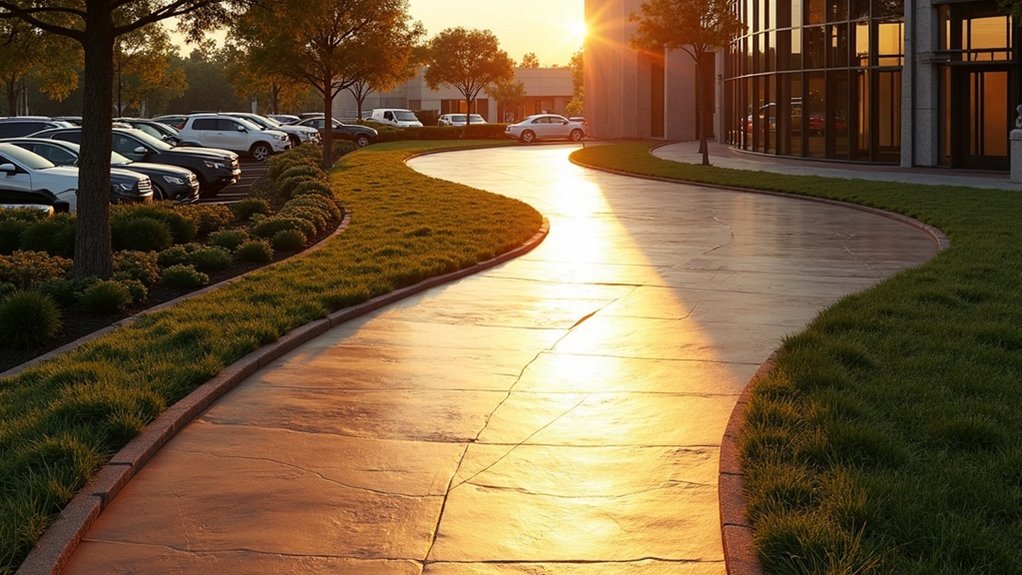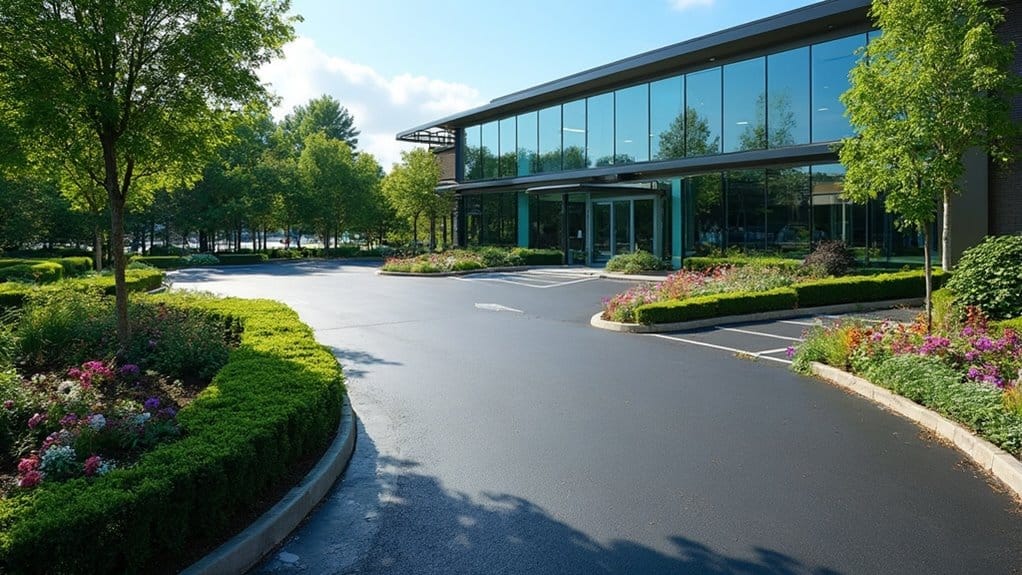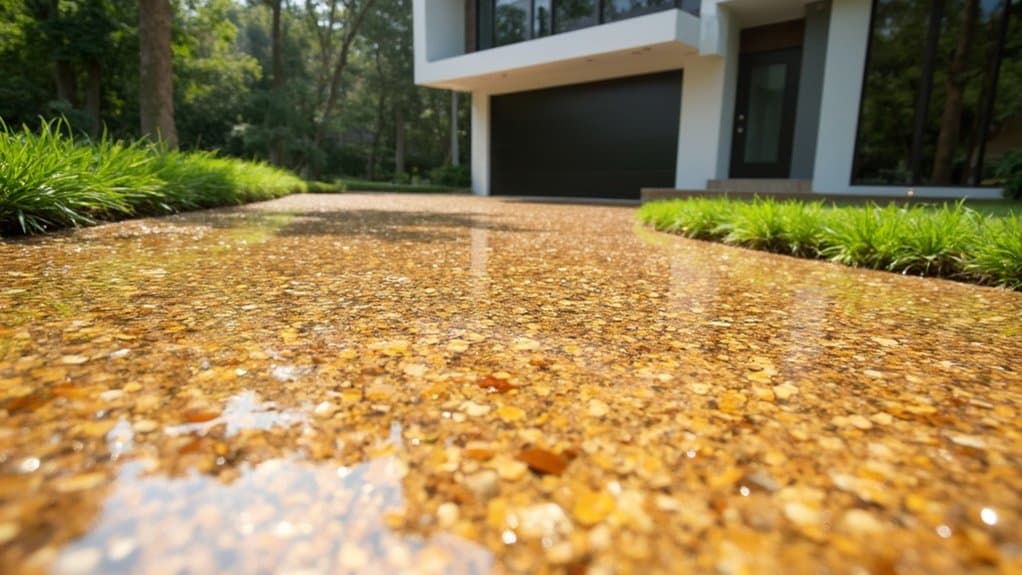Resin driveways can be a good choice for commercial properties if they are installed and maintained properly. They are durable, lasting up to 30 years, and require minimal upkeep, such as regular sweeping. However, it’s crucial to prepare the subbase correctly, especially in areas with heavy traffic, where you might need additional support. While resin driveways work well for standard vehicles, they could face challenges with heavy goods vehicles. If you’re thinking about a resin driveway for your commercial space, it’s important to weigh both the benefits and limitations.
Table of Contents
ToggleKey Takeaways
Resin driveways are a durable option for commercial properties, lasting between 25 to 30 years with proper installation. They are ideal for standard and medium vehicles, but if you have heavy vehicles over 7.5 tonnes, you’ll need to ensure the substrate is reinforced for added longevity.
One of the main advantages of resin driveways is their minimal maintenance. Regular sweeping and the occasional jet wash are usually all that’s required, making them practical for busy commercial sites.
Additionally, effective drainage is a key feature, helping to prevent standing water and enhancing safety and functionality in commercial settings.
When considering a resin driveway, it’s important to assess the traffic load and volume to ensure the resin thickness is adequate for your specific needs.
Durability and Longevity of Resin Driveways
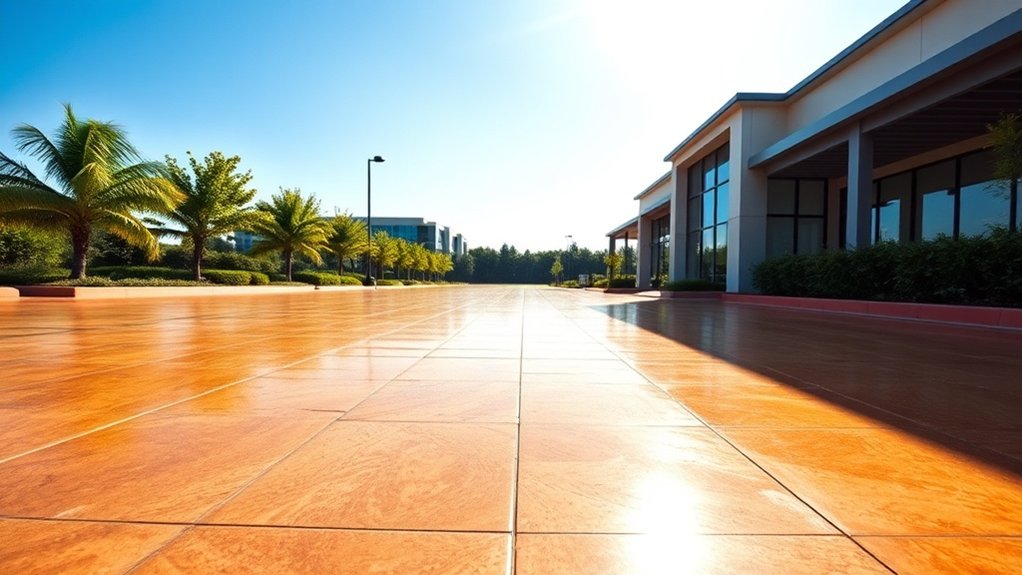
When evaluating the durability and longevity of resin driveways for commercial properties, it’s crucial to understand that proper installation plays a vital role.
Resin-bound driveways can last between 25 to 30 years, significantly outlasting resin-bonded types, which typically last around 8 to 15 years. This difference largely depends on professional groundwork and drainage preparation, which are essential for withstanding heavy commercial traffic and pressures of up to 400 tonnes per square centimetre. Additionally, the porous nature of resin-bound surfaces allows for effective water drainage, reducing the risk of damage from standing water.
Quality installation reduces the chances of cracking and shifting, helping to maintain the surface’s structural integrity under frequent use. Furthermore, lower long-term maintenance needs contribute to the overall cost-effectiveness of resin-bound driveways, making them a smart investment for commercial properties.
With the use of UV-stable resins and permeable surfaces, resin driveways are resilient against environmental damage, ensuring long-lasting performance.
Therefore, they’re an excellent choice for high-traffic commercial areas.
Maintenance and Upkeep Requirements
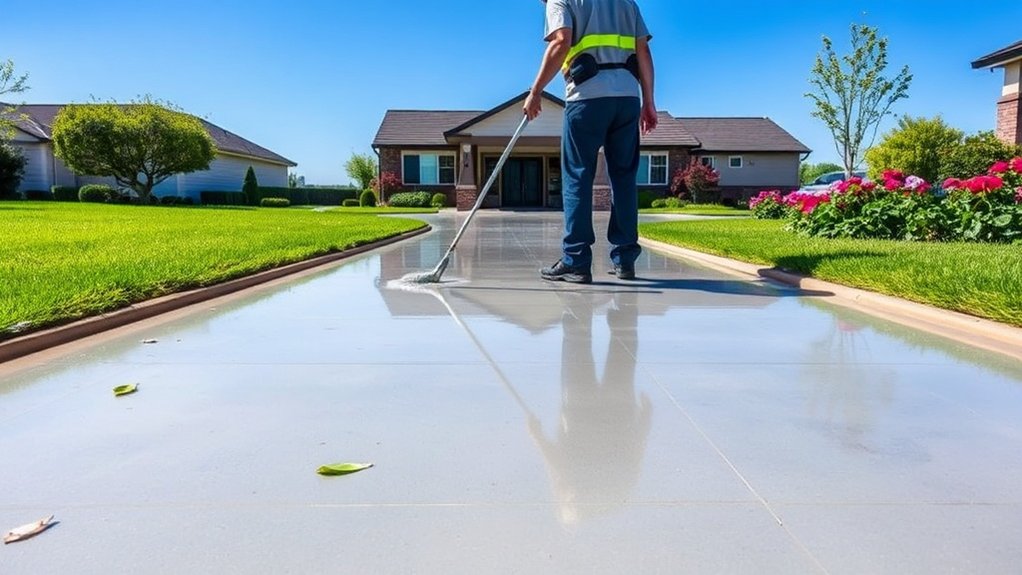
Maintaining a resin driveway is simple and requires minimal cleaning to keep it in excellent condition. To prevent stains and damage, use suitable cleaning methods and steer clear of harsh techniques that could harm the surface. Regularly sweeping away leaves and debris, and rinsing with water when necessary, can help maintain its appearance. Additionally, regular cleaning can prolong the driveway’s lifespan and enhance its aesthetic appeal.
Minimal Cleaning Needs
Resin driveways require minimal cleaning, making them perfect for commercial properties. You mainly need to sweep them regularly and occasionally jet wash to keep them looking tidy. This simple upkeep can be done without professional assistance, saving you time and money. Proper installation and maintenance can significantly extend the lifespan of these driveways, ensuring they remain in excellent condition for years to come. Regular pressure washing helps maintain the original color and shine of the driveway.
| Cleaning Technique | Upkeep Frequency | Notes |
|---|---|---|
| Regular Sweeping | Weekly | Clears leaves and dirt |
| Jet Washing | Every 6-12 months | Use cold water from 20cm |
| Immediate Spill Cleanup | As needed | Prevents staining |
With proper drainage and groundwork, these driveways need only minor repairs and cleaning, ensuring your property stays visually appealing with minimal effort.
Stain Prevention Techniques
To keep your resin driveway in top condition, it’s essential to use effective stain prevention techniques. Start by managing spills immediately; use paper towels or cat litter to soak up any spills and prevent them from sinking in. For oil or grease stains, blot them quickly to absorb as much as possible. Avoid letting organic materials, like bird droppings, linger on the surface.
Regular upkeep is crucial: sweep your driveway weekly and hose it down monthly to prevent dirt accumulation.
Applying a high-quality sealant can provide an extra layer of protection against spills and stains, and it enhances resistance to organic growth. When cleaning, use pH-neutral cleaners for everyday grime, and for stubborn stains, a diluted bleach solution can be effective.
Damage From Improper Methods
Neglecting proper maintenance can cause serious damage to your resin driveway, particularly in commercial areas with heavier traffic.
Issues such as cracking often stem from inadequate sub-base preparation or poor drainage, while loose stones may result from incorrect resin-to-aggregate mixing.
To prevent these problems, carry out regular damage checks and implement effective maintenance routines.
Sweep and jet wash your driveway every 6-12 weeks to remove debris and prevent staining. Seal small cracks promptly to stop moisture from getting in.
Use UV-resistant resins and protective sealants to avoid fading. Hand-remove weeds and check drainage systems regularly to ensure proper runoff.
Installation Considerations for Commercial Use
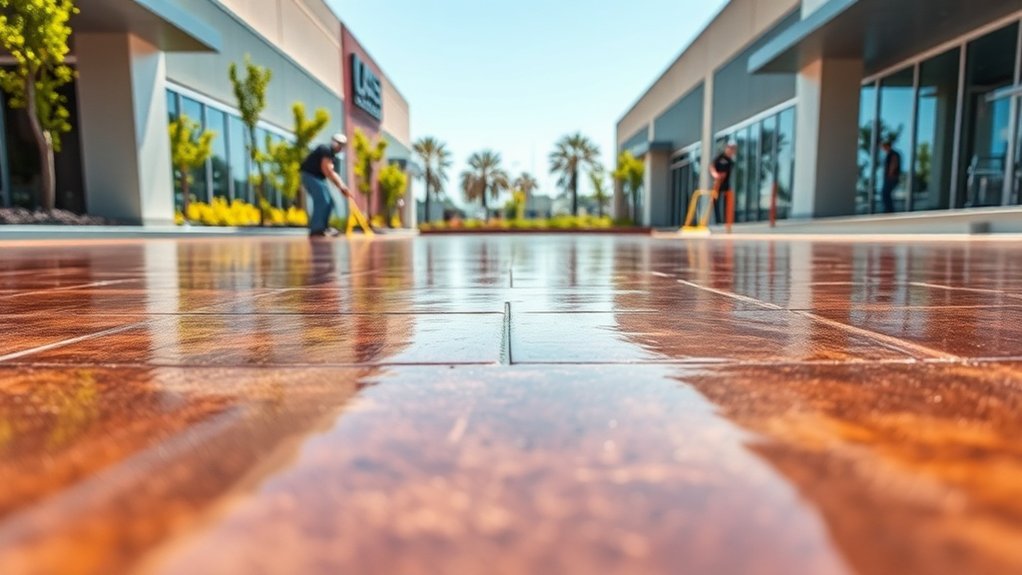
When installing resin driveways for commercial properties, a proper subbase is crucial for long-lasting durability and performance.
Start by clearing debris and levelling the ground to support heavy traffic effectively. Using a permeable subbase improves drainage and integrates with Sustainable Urban Drainage Systems (SUDS), helping to prevent puddles.
Avoid installing resin in wet conditions, as this can weaken the material.
The installation process, which involves mixing resin components and applying aggregate stones, is fairly quick, ensuring minimal disruption.
However, accuracy during application is key to achieving a uniform finish and preventing premature damage in a commercial setting.
Cost Factors Associated With Resin Driveways
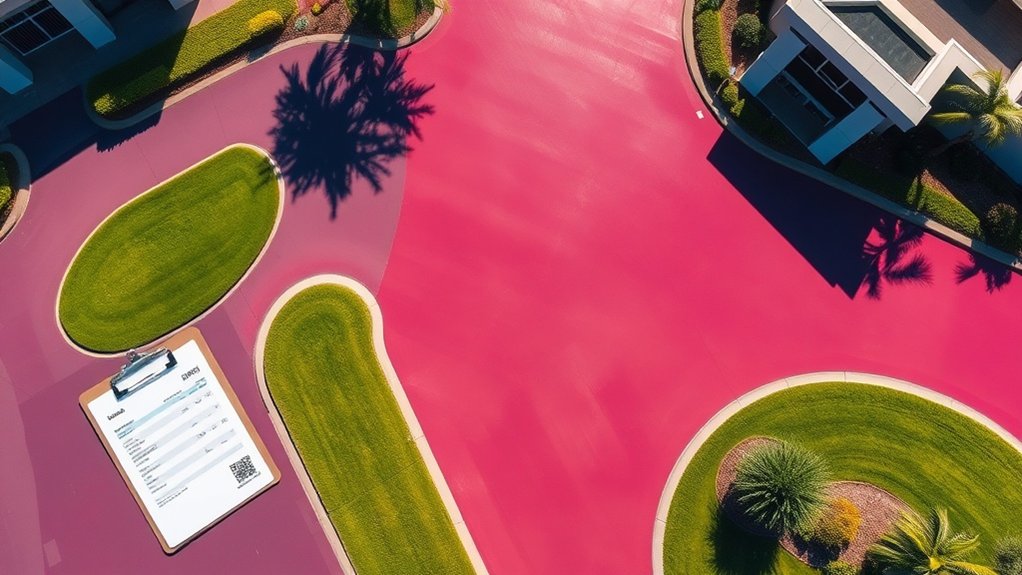
When considering resin driveways for your commercial property, it’s essential to understand the associated costs. The price of materials can vary significantly depending on the type of resin and the choice of aggregate. For instance, polyurethane resins are typically stronger but come at a higher price, while speciality aggregates can also increase costs.
The preparation work needed can affect expenses as well. For example, applying a simple overlay on an existing surface is usually less expensive than carrying out a full excavation for an unpaved area.
Other factors include the complexity of the labour involved, the size of the project, and any necessary surface repairs. Larger areas often benefit from bulk pricing.
Moreover, if you’re considering custom designs or need to comply with specific regulations, these can add to your initial costs. By keeping these factors in mind, you can budget effectively and make well-informed decisions for your property.
Aesthetic and Environmental Benefits
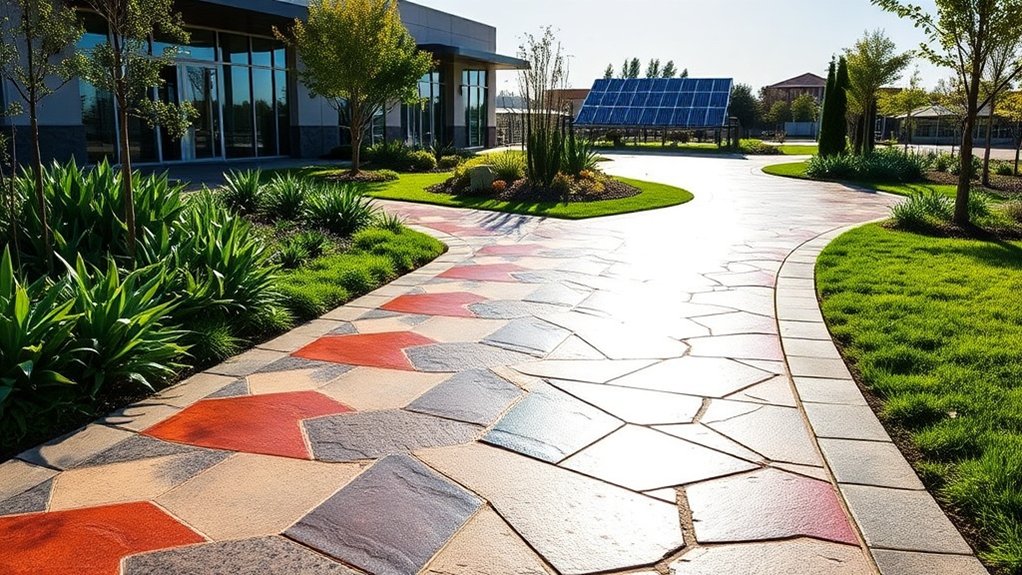
Resin driveways not only boost the visual appeal of commercial properties but also offer important environmental benefits. With a variety of colours, patterns, and textures available, you can easily find a design that matches your building’s style and brand.
The smooth, seamless finish enhances your property’s curb appeal, conveying professionalism and sophistication.
From an environmental standpoint, resin driveways are permeable, helping to reduce surface water accumulation and support groundwater replenishment. Many products also use eco-friendly materials, which lessens their environmental impact compared to traditional paving options.
Furthermore, their low maintenance needs help to conserve resources over time. By opting for resin driveways, you not only make a strong first impression but also contribute to sustainable development, benefiting both your business and the environment.
Suitability for Various Commercial Properties
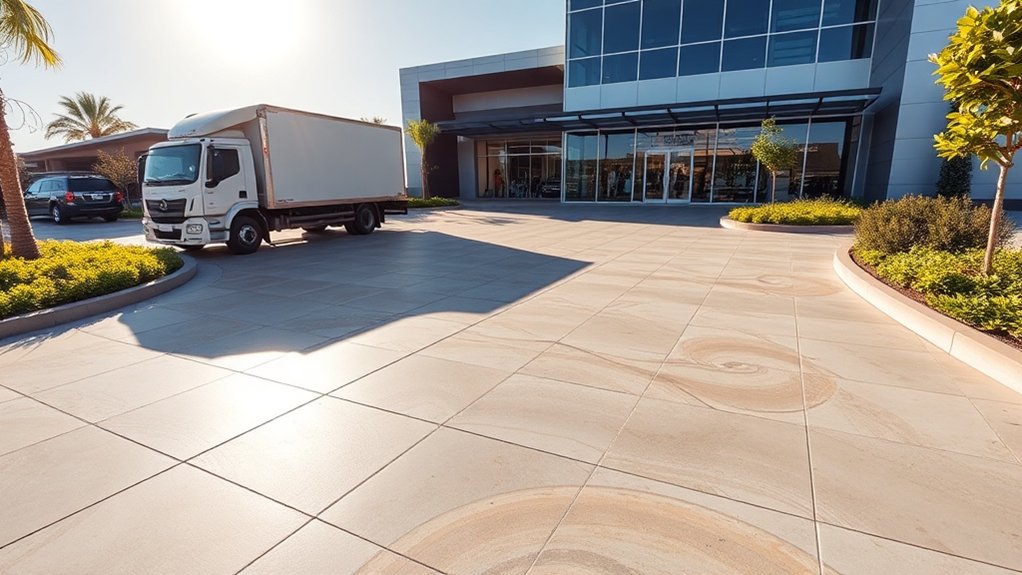
Choosing resin driveways for commercial properties meets a variety of business needs.
These driveways are perfect for retail shops, offices, and light industrial sites, offering a durable and attractive surface that boosts curb appeal.
Businesses can customise resin surfaces to incorporate branding, making them ideal for hospitality and leisure venues that value aesthetics and safety.
However, it’s worth noting that heavy industrial sites and logistics centres may not be suitable for resin, as heavy goods vehicles can cause significant wear.
Assessing Traffic Load and Usage Frequency
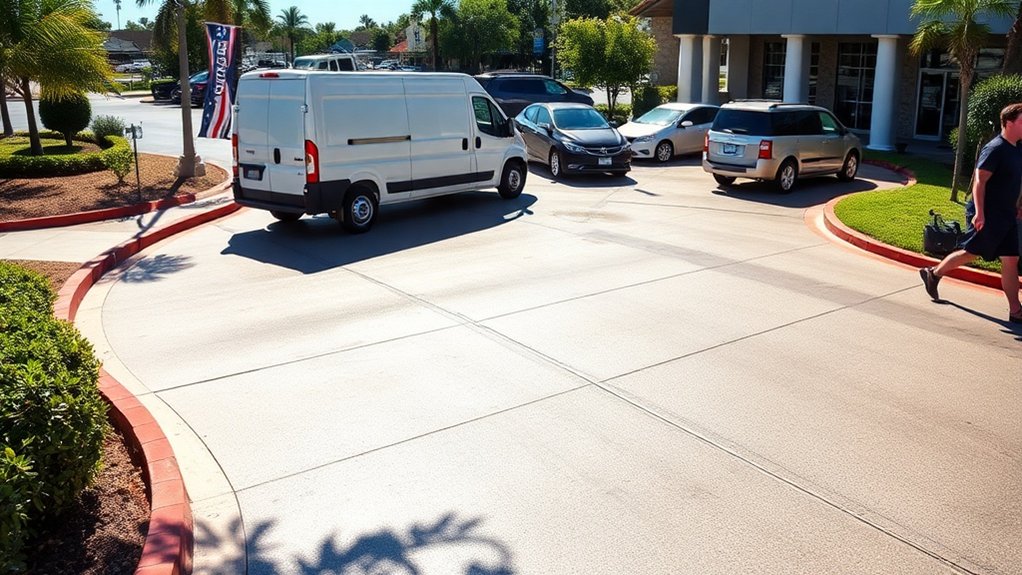
When assessing the traffic load and usage frequency of your resin driveway, it’s important to consider the types of vehicles that will be using it.
For instance, heavy commercial vehicles can put significant pressure on the surface, which may affect its durability over time.
If you anticipate high traffic levels, a sturdy design is essential.
Understanding these factors will help ensure your driveway remains strong and performs well under different conditions.
Vehicle Type Considerations
Understanding the weight capacity and traffic load of vehicles is crucial for ensuring the longevity of your resin driveway. Here are some key considerations:
- Standard Vehicles: Average cars (around 1.4 tonnes) and small delivery vans (up to 3.5 tonnes) are well-suited to a standard resin driveway.
- Medium Goods Vehicles: Vehicles under 7.5 tonnes, such as box vans, usually perform well, provided the base is properly prepared.
- Heavy Commercial Vehicles: Trucks over 7.5 tonnes need additional substrate reinforcement to prevent damage from their weight and frequent use.
When planning your driveway, think about the frequency and weight of the vehicles using it.
Regular checks and maintenance can help keep your resin driveway in good condition under varying traffic loads.
Traffic Volume Impact
As traffic volume increases, the demands on your resin driveway also rise. It’s important to assess both load capacity and how frequently the driveway will be used.
By understanding traffic patterns, you can determine the required resin thickness and sub-base quality. For commercial settings, a thickness of 15-18 mm is necessary to support vehicles weighing up to 7.5 tonnes without causing wear.
A well-compacted sub-base ensures even load distribution, which helps prevent surface cracks and deformation.
If your driveway experiences frequent, high-volume traffic, consider reinforcing the surface to maintain its integrity.
On the plus side, resin driveways require minimal maintenance. With proper installation, they can effectively handle constant vehicle movement, enhancing operational efficiency in busy commercial areas.
Frequently Asked Questions
Can Resin Driveways Be Repaired if Damaged?
Yes, resin driveways can be repaired using several techniques. Regular checks and timely repairs are crucial to prevent further damage, helping to maintain the driveway’s integrity and extend its lifespan, ultimately saving you from expensive resurfacing later on. For example, if you notice small cracks or discolouration, addressing these issues quickly can make a significant difference.
How Does Temperature Affect Resin Driveway Installation?
When installing a resin driveway, temperatures above 30°C can lead to uneven curing. To achieve the best results and ensure durability, it’s advisable to work within a temperature range of 20°C to 25°C. This helps maintain the quality of the installation, much like how a cake needs the right oven temperature to bake evenly. Following these guidelines will enhance the longevity of your driveway.
What Types of Vehicles Can Safely Use Resin Driveways?
Resin driveways are suitable for passenger cars, light commercial vehicles, and medium-duty trucks. However, heavy machinery needs a reinforced sub-base to handle their weight, which helps maintain the driveway’s durability and prevents surface damage.
Are There Any Warranties Offered for Resin Driveways?
Yes, warranties for resin driveways generally range from 1 to 25 years, covering defects related to poor materials and workmanship. However, it’s important to note that certain types of damage may not be included, and following specific installation and maintenance guidelines is essential for the warranty to remain valid.
Can Resin Driveways Be Installed in Colder Climates?
Yes, resin driveways can be installed in colder climates. They are durable enough to withstand freezing temperatures and require minimal maintenance during winter. Skilled professionals ensure proper installation techniques, which enhance their performance and longevity even in harsh conditions.
Conclusion
In conclusion, resin driveways are a practical option for commercial properties, offering both durability and visual appeal. Much like a well-fitting suit, they cater to diverse business requirements while withstanding heavy foot and vehicle traffic. With straightforward maintenance and a variety of design choices, they not only fulfil a functional role but also enhance the overall look of your property. By considering installation costs and their suitability, you’re not just creating access; you’re making an investment that leaves a lasting impression on customers and clients.
Discover the durability and design flexibility of tarmac driveways for commercial properties, but what other advantages could they offer your Read more
Learn about the benefits, types, and installation process of resin driveways, and discover why they might be the perfect choice Read more
Are you confused about resin-bound and resin-bonded driveways? Discover the key differences that could impact your property choice.

